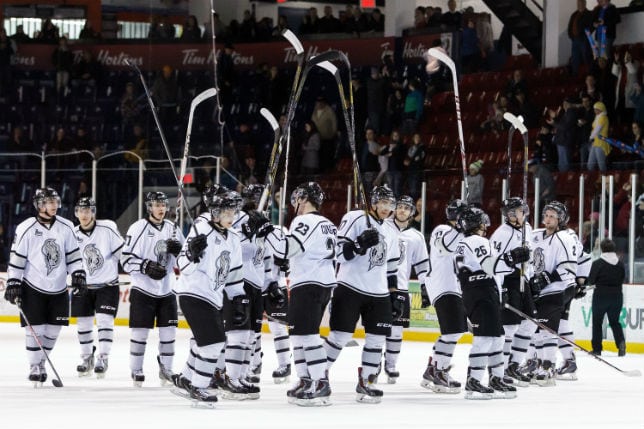
Call them hockey players or amateurs, but don't call them employees
It's only fitting that players for the four Washington State teams in the WHL would be deemed non-employees. That's because there's no company in North America that would treat its employees the way the people who run junior hockey treat their players.
 Call them hockey players or amateurs, but don't call them employees
Call them hockey players or amateurs, but don't call them employeesSo according to Senate Bill 5893, teenagers who play for the Everett Silvertips, Seattle Thunderbirds, Spokane Chiefs and Tri-City Americans are forever to be deemed amateur athletes, not employees.
And in what was effectively sticking up their middle finger to those who are trying to unionize players in the Canadian Hockey League, WHL president Ron Robison and representatives from the four Washington-based team in the league were on hand Monday afternoon, beaming with pride as Washington governor Jay Inlsee officially signed the bill into law.
As expected, Robison heaped praise upon the governor, Senate and House of Representatives in Washington State, saying the legislation, “will allow our four Washington-based clubs to continue offering world class development and education opportunities, as they have been doing in the state for close to 40 years.
“We fully expect other jurisdictions in our region to adopt similar legislation as Washington and Saskatchewan have,” Robison continued, “in order to ensure our teams are in a position to continue operating as they have for decades.”
Which means these teams will continue to offer world-class training, coaching and facilities, room and board for each player, equipment and post-secondary education packages. And they’ll continue to pay their players poverty wages under the guise of them being amateur athletes and not employees. So let’s see how WHL players and their counterparts in the OHL and QMJHL are non-employees:
* They are drafted as teenagers by one team in one league over which they have no control. They are allowed to negotiate only with the team that drafts them and if that is hundreds of miles away from home, so be it. But they’re not employees.
* If they don’t have a no-trade clause in their contracts, they can be dealt to any other team in the league, again with absolutely no say in the matter. But they’re not employees.
* Of all of the events that occur in the arenas in which they play, they create wealth for the owners and everyone involved, the same way rock concerts, boat shows, evangelical revivals and Disney on Ice do. But they’re not employees.
* They show up for work on game nights the same way popcorn makers, beer sellers, maintenance staff and Zamboni drivers do, but they’re the only ones who are by law not required to receive at least a minimum hourly wage. Because they’re not employees.
* They are required to show up every day, on time, for practice and games. But they’re not employees.
* They’re expected to represent their teams at charitable and community events that help raise the profile of the organization in the community and create good will with the paying customers. But they’re not employees.
* They’re expected to follow the boss’s orders without question. If the coach tells them to go out and fight, they do it. They’re expected to do whatever it takes within their power to help their team win games and they basically have no recourse if they disagree with the powerful men who control their careers and their lives. Because they’re not employees.
* If they return in the middle of the night from a road trip and the coach isn’t pleased with the way they’ve played, they can be required to immediately put on their equipment and practice. Because they’re not employees.
* They can be sent home at any time for any reason. They can show up for work one day and find their belongings stuffed into a green garbage bag and receive no severance pay or compensation package or even an escort back home. Because they’re not employees.
* Virtually every person they come into contact every single day with their team – from the GM and coach to the team secretary – is an employee of the team. But they’re not employees.
* When they turn 18, instead of having the option to play in a league that’s better suited to their abilities where they can make more money – such as the AHL – they are forced to go back to riding buses and playing with inferior players if they’re not good enough to play in the NHL. Because they’re not employees.
* They are expected to occasionally sacrifice class and study time for road trips, practices and team meetings. But they’re not employees.
* They’re expected to respect the team hierarchy and rules without exception, the same way anyone else in any other workplace would be expected to do. They’re expected to pick up pucks after practice and sit in a certain part of the bus for no other reason than they’re rookies on the team. But they’re not employees.
* They have dreams of one day parlaying their hard work and sacrifice in junior hockey into a pro career, the same way most of the coaches, GMs and referees who work alongside them do. But they do it for a tiny fraction of the compensation. Because they’re not employees.
Actually, it’s no wonder the legislators in Washington State came to the conclusion that junior hockey players are amateur athletes and not employees. After all, would any company in the world even dream of treating its employees like that?